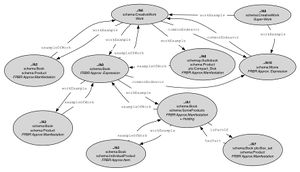Recipes and Guidelines
Using Schema.org to describe bibliographic resources is a great way to share structured data about those resources on the web. This page draws together examples created whilst building vocabulary proposals for extensions and enhancements to the Schema.org vocabulary. These are presented as examples and guides for those wishing to describe their bibliographic, and similar resources.
Compromises
Schema.org is a generic vocabulary designed to be able to describe most things you may find on the web, some compromises in the naming of Types and Properties have to be made, when compared with a vocabulary focused upon a single domain. For example, in the bibliographic world we expect books to have a ‘title’ property, whereas in Schema we use ‘name’. Additionally there are compromises in the granularity of detail that can be described with Schema, compared with rich bibliographic specific vocabularies. Such domain specific detail would over complicate the generic nature of Schema. Despite these compromises, Schema does a good job of describing bibliographic resources in sufficient detail to be understood by search engines and the wider web.
When to use Schema.org
When you wish to describe resources to search engines and the wider web using structured data. To that end, you would use either Microdata or RDFa (more specifically RDFa Lite) as a method for embedding it in html mark up. As a mechanism for sharing structured data about your resources it places no constraints on the way your data is created, stored, or any other vocabularies used for description.

Serialisations used in examples
Schema.org is a vocabulary that can also be represented in RDF. RDF has several serialisations - RDFa, RDF/XML, N-triples, Turtle, JSON-LD, etc. - for clarity some of the authors have included several different serialisations in their examples - the meaning should be identical regardless of the serialisation used.

Example Library
The Example Library is a collection of wiki pages demonstrating the proposed markup for Creative Works of various types. The objective is to demonstrate vocabulary usage, and markup examples. For instance check out this simple example of a paperback book, including a link to a description of the conceptual Work of which it is an example, plus a link to a description of the same book at WorldCat.org.
Recipes
Recipes listed provide general guidance for the use of Schema.org to describe resources.
- My First Book - A simple exercise to start with
- Choosing a Serialisation
- Using Multiple Types
Examples
These are specific examples extracted from proposals and recommendations developed within the Schema Bib Extend Community. As examples to support specific proposals, resources may not be described in them as fully as you would find in a real world implementation. This is for reasons of clarity, brevity, etc. All examples should be treated as framework examples to be built upon in your own environment.